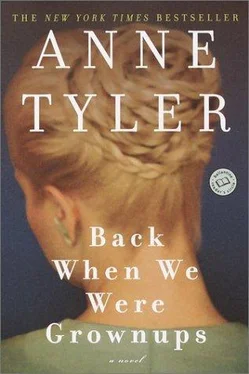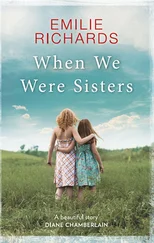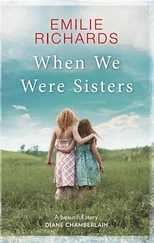Barry said, “Oh, no!” He stopped carving, his knife halfway through a thigh joint. “I didn’t wait for the blessing!” he told Rebecca.
“Never mind,” she said.
“I just started right in on the carving! I wasn’t thinking!”
“Um, actually, we don’t normally have a blessing.”
“You don’t?”
He got that rumple-browed look that NoNo seemed to find so fetching.
“Not even a moment of silence?” he asked.
“Well, I suppose—”
“Or, I know what!” He brightened. “We could do what my college girlfriend’s family used to do. They went around the table and people each said one thing apiece that they were thankful for.”
This struck Rebecca as a terrible idea. She was relieved when Zeb gave a groan.
But Barry didn’t seem to hear him. “What do you say, you guys?” he asked. And then, when no one spoke up, “Well, I’m not shy. I’ll go first. I’m thankful as all get-out to have my beautiful NoNo.”
NoNo looked at him. She lowered the basket of rolls that she’d been about to pass to Dixon, although Dixon was still reaching for it, and, “Why, Barry,” she said softly. “I’m thankful to have you, too.”
Joey made a gagging sound, but Min Foo frowned him into silence. It was clear, from the way people started stirring in their seats and clearing their throats, that they were bracing themselves to go through with this.
Rebecca looked beseechingly at Zeb. He grinned. All very well for him; she supposed he would say he was thankful for some kind of Child Welfare Act or something. And here was Hakim, plainly intrigued by this unfamiliar American custom but putting his own stamp on it; for he rose to his feet, still jiggling Abdul, as if he were preparing to deliver a formal speech. “I personally,” he said, “am thankful for my wife, Min Foo, and for my son, Abdul. And also for my other son, Joey, and my daughter, Lateesha. In addition, I would like to take this moment to—”
“Enough!” Min Foo said. She was laughing. “Time’s up, Hakim!”
Which, for some reason, set the baby off. He let out a sudden wail, and although he might have settled down again, Rebecca recognized an opportunity when it came along. She stood up and reached for him. “I’ll take him,” she said. And the instant she had him, she made away with him, out of the dining room completely.
Out of the dining room and through the parlors, toward the stairs. But in the foyer, she paused. She hoisted the baby higher on her shoulder and opened the front door. It wasn’t raining anymore, although a thick mist still hung like veils. The air was soft and mild, a kind of non-temperature against her skin. She stepped outside and shut the door behind her.
The baby, who had been uttering chirps of protest, abruptly stopped and raised his head from her shoulder to look around.
She walked down the front walk and turned right, passing the meditation center and the blue-gable house. The mist was so dense that the baby started making small gulping sounds, as if he thought he was underwater. She figured he must be warm enough, though, because he was swaddled in a receiving blanket. His little body felt compact and solid, much heavier than the last time she had carried him, and he held himself in a more organized, more collected sort of way.
She crossed the street toward a maple sapling that still had a few of its leaves, red as lipstick. “See?” she told the baby. “Red! Isn’t it pretty?” She turned him slightly so that he was facing the sapling. He blinked and let his gaze travel across it, his head bobbling slightly with the effort of concentration. He no longer had that squinchy newborn look; he was wide-eyed and alert. His cheek, when she set hers against it, was so silky that she almost couldn’t feel it.
They had so far had the street to themselves — they’d had the whole world to themselves — but now a bus loomed out of the fog and stopped beside them. The doors opened with a wheeze, letting off two dark-eyed young women, one of them obviously pregnant. They were followed by a tall young man in glasses, and the three of them stood at the bus stop a moment laughing and interrupting each other, riding over each other’s words, talking about a party they had been to the night before. Then they moved off down the street, and as their voices faded, Rebecca noticed the quiet surrounding her and the baby. It was that cottony, thick, enclosing quiet that often descends with a fog, and it made her long, all at once, for the clamor of her family.
Anyhow, Abdul must be getting hungry. He was nosing hopefully into the crook of her neck. She turned and started home.
The mist was settling on her hair. She could see the glints in the strands that fell over her eyes. The hem of her skirt was growing heavy with moisture. The baby’s mouth against her skin felt like a cool little guppy mouth.
Had it ever crossed her mind that Joe had married her for her usefulness? Yes, it had crossed her mind. And never more so than after he died; just up and willfully died and left her to cope on her own.
Now, though, she saw what he had rescued her from: that ingrown, muted, stagnant, engaged-to-be-engaged routine that had started to chafe her so. Oh, he had been just as useful to her; no doubt about it. What she’d told NoNo was true.
And while she had once believed that she’d been useful only in practical matters (tending the little girls, waiting on Mother Davitch), now she saw that her most valuable contribution had been her joyousness — a quality the Davitches sorely lacked. Not that she herself was joyous to begin with. No, she had had to labor at it. She had struggled to acquire it.
Timidly, she experimented with a sneaking sense of achievement. Pride, even. Why not? It didn’t seem all that misplaced.
She carried the baby home jauntily, striding straight through the puddles, wearing jewels of mist in her hair and holding her head high.
As luck would have it, Poppy’s party fell on a day when two paying events could have been scheduled instead. One was just a small luncheon, but the other was a Christmas party for a brokerage firm, and Rebecca was very sorry to have to turn it down. A promise was a promise, though. She had told Poppy they would celebrate on his actual birth date. Enough of these second-best, orphan compromises — major milestones observed midweek or shoved into the next month so as not to interfere with more important people’s arrangements.
So: December 11th, a Saturday. The plan was to begin at two in the afternoon, for the little ones’ sake, and extend into early evening. Presents were not discouraged. (Poppy had been firm about that.) Food would be served from the very beginning; none of this waiting around for the toasts. Lots of desserts, but no savories, no hors d’oeuvres or crudités, certainly no main dishes. And the centerpiece would be a towering cake, really more of a wedding cake, prepared by Toot Sweet in Fells Point. Poppy had done the research: Toot Sweet was the winner. Fortunately, Biddy didn’t take offense. “Fine with me,” she said. “I have enough on my hands with all those pastries he wants.”
The guest list — saved these past six months in the pocket of Rebecca’s calico skirt, where it had gone through the laundry twice and emerged as soft as blotting paper but still comparatively readable — consisted mostly of family, plus two of Poppy’s old friends, plus some incidental acquaintances like his physical therapist and Alice Farmer. (It was ironic, Rebecca often reflected, that by definition those family parties that were largest and most demanding were the ones to which Alice Farmer had to be invited as a guest.) There had been more people on the list, but many of them were dead. A few others were too frail to attend, and a few had simply dropped out of sight at some unnoticed point in the past.
Читать дальше












